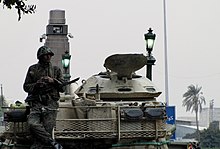| Part of a series on the Egyptian Crisis (2011–2014) |
|---|
 |
|
|
The 30 June revolution occurred in Egypt on 30 June 2013, marking the one-year anniversary of Mohamed Morsi's inauguration as president.[21] The events ended with the 2013 Egyptian coup d'état after mass protests across Egypt demanding the immediate resignation of the president.[22] The rallies were partly a response to Tamarod, an ostensibly[23] grassroots movement that launched a petition in April 2013, calling for Morsi and his government to step down. Tamarod claimed to have collected more than 22 million signatures for their petition by June 30,[24][25][26] although this figure was not verified by independent sources.[27] A counter-campaign in support of Morsi's presidency, named Tagarod (meaning impartiality), claimed to have collected 26 million signatures by the same date,[28] but this figure was also unverified and not mentioned in media nearly as much as Tamarod's, with no reliable sources repeating it.[29] The movements in opposition to Morsi culminated in the June 30 protests that occurred across the country. According to the Egyptian military, which calculated the number of protesters via helicopter scans of demonstration perimeters across the country, the June 30 protests had 32 million protesters, making them "the biggest protests in Egypt's history."[22][30] However, independent observers raised concerns that the Egyptian government exaggerated the actual number of anti-Morsi protestors, with some research determining that only around one to two million people protested across the country against Morsi.[31][32]
Reasons for demanding Morsi's resignation included accusations of increasing authoritarianism and his pushing through an Islamist agenda disregarding the predominantly secular opposition or the rule of law.[33][34][35] The uprising concluded seven months of protests that started when the Morsi government issued a highly controversial constitutional declaration that gave him temporary sweeping powers over the state's judicial system until the new constitution was passed.[36][37][38] The June 30 protests resulted in the overthrow of Morsi by the Egyptian military three days later, with Adly Mansour replacing Morsi as president of Egypt on July 4.[39]
- ^ "From Egypt petition drive, a new grassroot wave". AP. 28 June 2013.
- ^ "Ahmed Maher of 6 April Movement discusses current Egyptian situation". Daily News Egypt. 2 July 2013.
- ^ a b "Egypt's Revolutionary Socialists call for general strike until the fall of the regime". Socialist Worker. 30 June 2013.
- ^ "June 30 Coordinating Committee plans for week-long protests - Politics - Egypt". Ahram Online.
- ^ "Al-Wafd repeats commitment to boycott". Daily News Egypt. 2 March 2013.
- ^ "Al-Azhar denies siding with Egyptian government". Al-Monitor. 19 November 2013.
- ^ "Egypt's Morsi, Brotherhood seek allies; army mulls 'possible 30 June scenarios'". Al-Ahram. 19 June 2013.
- ^ "Copts free to join 30 June anti-govt protests: Egypt's Coptic Church". Al-Ahram. 21 June 2013.
- ^ "Egyptian Judges Challenge Morsi Over New Power". The New York Times. 24 November 2012.
- ^ "Is the World Afraid of Egyptian Nationalism?". Mara House Luxor. 12 July 2013.
- ^ "Thoughts on June 30th, Tamarod, and the future of liberal democracy in Egypt". The Struggle for the World. 1 July 2013. Archived from the original on 8 October 2013.
- ^ "Thousands flood Egypt's streets to protest against Morsi". The Irish Times. 1 July 2013.
- ^ "The 'S-Word': Egyptian Movement Takes On Islamic Rule". Al-Monitor. 27 April 2013.
- ^ "My religion is "none of your business": Campaigning against division". Daily News Egypt. 21 April 2013.
- ^ "Black Bloc vows "not to use violence on June 30"". Gulf News. 10 June 2013.
- ^ "Another revolution in Egypt: Insights from Egyptian feminist Amal Abdel Hadi". Women's Learning Partnership (Blog). 29 June 2013. Archived from the original on 10 June 2015. Retrieved 15 January 2014.
- ^ "Ahead of anti-Morsi protests, artists target Egypt's minister of culture". Index on Censorship. 28 June 2013.
- ^ "Egypt intellectuals retaliate against culture minister after urgent meeting". Ahram Online. 7 June 2013.
- ^ See[17][18]
- ^ "Press Release by Operation Anti-Sexual Harassment/Assault on Sexual Assaults during 30 June Demonstrations". Jadaliyya. 2 July 2013.
- ^ "30 يونيو.. ثورة كرامة ضد أعداء الوطن". اليوم السابع. 29 June 2017. Retrieved 25 May 2018.
- ^ a b "Millions flood Egypt's streets to demand Mursi quit". Reuters. 30 June 2013.
- ^ "How Egypt's Rebel Movement Helped Pave the Way for a Sisi Presidency". BuzzFeed News. 15 April 2014.
- ^ "Egypt braced for massive pro and anti-Morsi protests". France 24. 30 June 2013. Retrieved 20 October 2021.
- ^ "Profile: Egypt's Tamarod protest movement". BBC News. 1 July 2013. Retrieved 20 October 2021.
- ^ Welle (www.dw.com), Deutsche. "Egypt's Tamarod and the military united for now | DW | 03.08.2013". DW.COM. Retrieved 20 October 2021.
- ^ "Tamarod". Carnegie Endowment for International Peace. Retrieved 20 October 2021.
- ^ "'Rebels' vs. Rivals: Meet the challengers to Egypt's June 30 campaign". Al Arabiya English. 30 June 2013. Retrieved 20 October 2021.
- ^ "Tamarod: A Linguistic Riddle". www.internationalboulevard.com. Retrieved 20 October 2021.
- ^ "Millions flood Egypt streets to demand Morsi ouster". AFP. 30 June 2013.
- ^ "How Egypt's generals used street protests to stage a coup". Washington Post. 3 July 2017. Retrieved 7 March 2018.
- ^ Elmasry, Mohamad (3 July 2015). "Morsi myths: Re-examining justifications for Egypt's coup". Middle East Eye. Retrieved 7 March 2018.
- ^ Patrick Kingsley (30 June 2013). "Protesters across Egypt call for Mohamed Morsi to go". The Guardian.
- ^ Hendawi, Hamza; Macdonald, Alastair (30 June 2013). "Egypt protests: Thousands gather at Tahrir Square to demand Morsi's ouster". AP via Toronto Star. Retrieved 30 June 2013.
- ^ Spencer, Richard (1 July 2013). "Egypt protests: Army issues 48-hour ultimatum for agreement amid clashes". The Daily Telegraph. Cairo. Retrieved 1 July 2013.
- ^ Sheikh, David D. Kirkpatrick and Mayy El (22 November 2012). "President Morsi in Egypt Seizes New Powers". The New York Times. Retrieved 30 June 2018.
- ^ "Morsy issues new constitutional declaration". Egypt Independent. 22 November 2013.
- ^ "Egypt at a Crossroads after Morsi Grants Himself Sweeping Powers". Der Spiegel. 26 November 2012.
- ^ "Egypt swears in supreme court chief justice Adly Mansour as interim president after Mohammed Morsi removed by military". www.cbsnews.com. 4 July 2013. Retrieved 20 October 2021.
© MMXXIII Rich X Search. We shall prevail. All rights reserved. Rich X Search

